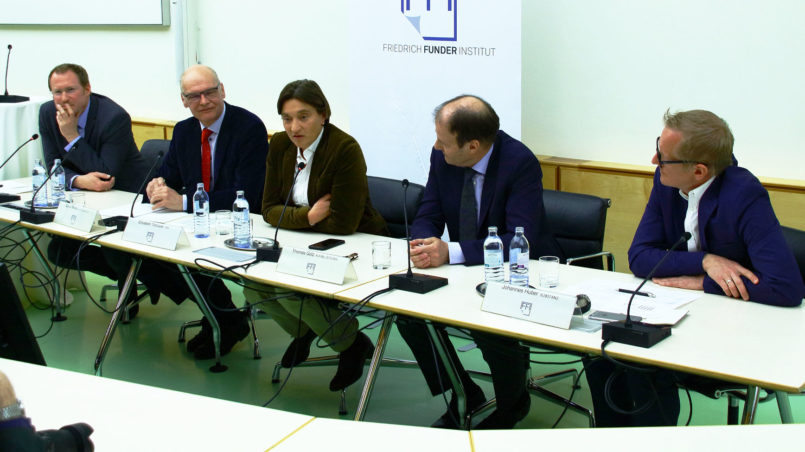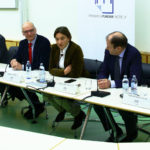What Future does Journalism Have?

Professional journalism has recently come under pressure due to several factors: on the one hand, under the banner of “fake news” doubts are arising as to its credibility while, on the other hand, social media today can turn anyone into a virtual private journalist. In addition, large media companies are being put under economic pressure by a clear loss of readers. A panel discussion held at the Friedrich Funder Institute (FFI) with the title, “In case of doubt, without journalists?” addressed these challenges on 9th April 2018 in the House of Industry in Vienna (Austria).
The president of the FFI, Gerald Grünberger, welcomed the topics of the discussion: the first focal point was “citizen journalism“, whereby the usual due diligence of professional journalists is hardly exercised any longer. As a second focus of the discussion, Grünberger addressed the concentration of power in the media sector: “The power over the algorithm also gives us the opportunity to influence the debates.”
Gerald Fleischmann, head of the strategic communications department at the Federal Chancellery and the political representative on the podium, expressed the view that one need not worry too much about classical journalism: “Technologies are constantly changing, but the function of journalism always remains the same. Journalism will always have its justification and economic benefit.” Everyone needs credible sources in order to participate in political discussions. “Maintaining objective credibility in the political debate is, therefore, an important function of the media system“, and it is the duty of politics to maintain this. He pointed out that communication with the government is now more predictable than at the time of the “Grand Coalition” when the coalition partners often did not agree among themselves: “There is now a plan and a team.”
Elisabeth Totzauer, TV journalist at ORF (Austria’s state television station), is also convinced that professional journalism has a value – in contrast to “unqualified anonymous individual reports“, which has nothing to do with journalism. Like Fleischmann, she is confident in her basic feeling and certain that the majority of the population still appreciate the value of journalism:
As long as we do not lose our journalistic standards, I will not worry.
She reminded the audience that ORF is in the possession of the population and should be of significance to them. However, she also admitted that the current development is a challenge for professional journalists: “We still have to sort ourselves in view of the numerous new media channels.”
Thomas Götz of the Kleine Zeitung (Austrian newspaper) claimed that the professional media are quite concerned, also in an economic sense due to the loss of advertising revenues and readers: “This can certainly cause problems.” However, the “collapse” of the established media system has not yet occurred despite many fears. The population is striving to become independent of the media, “but without professional media, it will be difficult to build social consensus“.
Johannes Huber from the Austrian online medium, “Die Substanz“, expressed his opinion that journalism can indeed work very well on the net because the online appearances of professional media are still regarded as “highly credible“. He even sees a “growing need for professional journalism that is credible“. He believes that there are great opportunities in the specialisation of professional journalists. In principle, he is also optimistic:
Information is gaining in value today, only the channels are changing.
In response to the question from the moderator, Claus Reitan, as to what constitutes the value of professional journalism, Elisabeth Totzauer replied that, for example, in the event of a riot in a foreign country without professional journalists on the spot, one could hardly assess the news from this country. Thus the danger of false reports is very high. As an example, she cites the pictures of a bombed combat helicopter which appeared in the media in 2014 – together with the claim that the helicopter had been shot down in Ukraine. Later, however, it turned out that the incident took place in Syria and had nothing at all to do with the Ukrainian conflict.1
Thomas Götz gave another example of distorting media coverage: in November 2017, recordings were made by the media that showed Donald Trump feeding carp during a state visit to Japan together with Japanese Prime Minister Shinzo Abe.2 The image of Trump pouring all the food into the water at once was generally seen as further proof of his insensitivity. In fact, his Japanese host had fed the fish in exactly the same way immediately before, but this was not seen due to the editing of the footage. “This was evil manipulation,” according to Götz.
Totzauer claimed that growth in the media industry worldwide is concentrated on moving image content. And here RTL (a German television station) is “the only company that is on Amazon and Netflix’s heels“.
Huber returned to the phenomenon of “citizen journalism“. He sees it as a “social task” to learn what to do when posting on Facebook. One has to explain to people that this is basically already journalism and, of course, one has a responsibility: “The sense of accountability that is necessary for this is not yet there.” Totzauer pointed out that especially hate posters in social media seem to have a much stronger effect in terms of numbers than they actually do. A few years ago, for example, some 2,000-3,000 people appeared so intensively through postings that “one had the feeling that this was half the Republic“. Huber also sees the communication potential of the social media in a positive light: “Journalists today receive much more immediate feedback and are also more closely monitored.”
All in all, the participants in the discussion agreed that, although journalism is under pressure, it is by no means in a crisis that threatens its very existence because the population is very much aware of its value. There was also agreement that the sense of responsibility for social media postings has to be increased, because these, too, are a form of journalism.
Translation German-English: Anna Dichen
–
1 http://blauerbote.com/2015/03/14/more-fake-images-of-russian-tanks-in-ukraine/
2 https://www.huffingtonpost.com/entry/donald-trump-fish-feeding-japan_us_5a000051e4b04cdbeb344d3d
Credits
| Image | Title | Author | License |
|---|---|---|---|
 |
00-Welche Zukunft hat der Journalismus?- | Idealism Prevails | CC BY-SA 4.0 |
